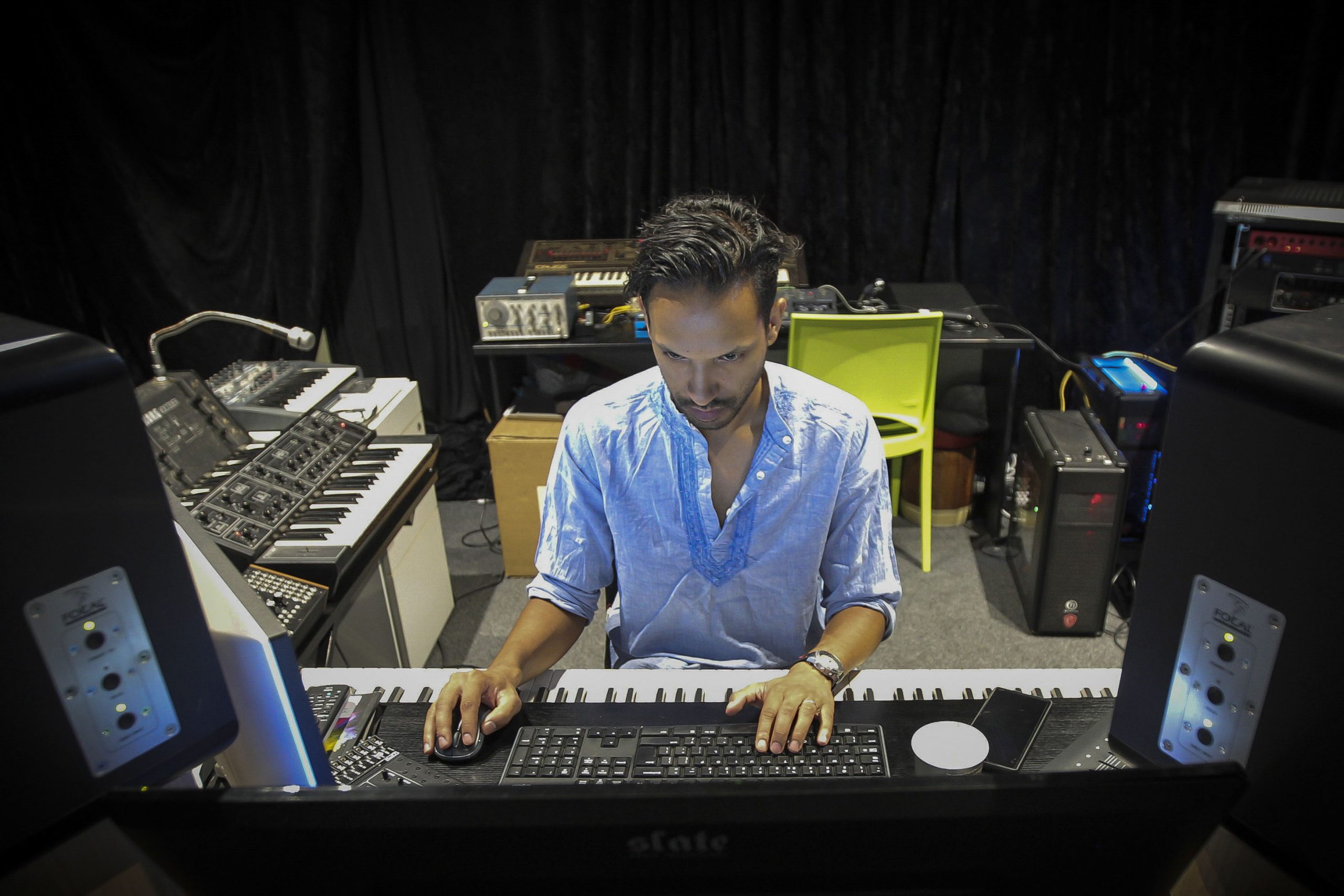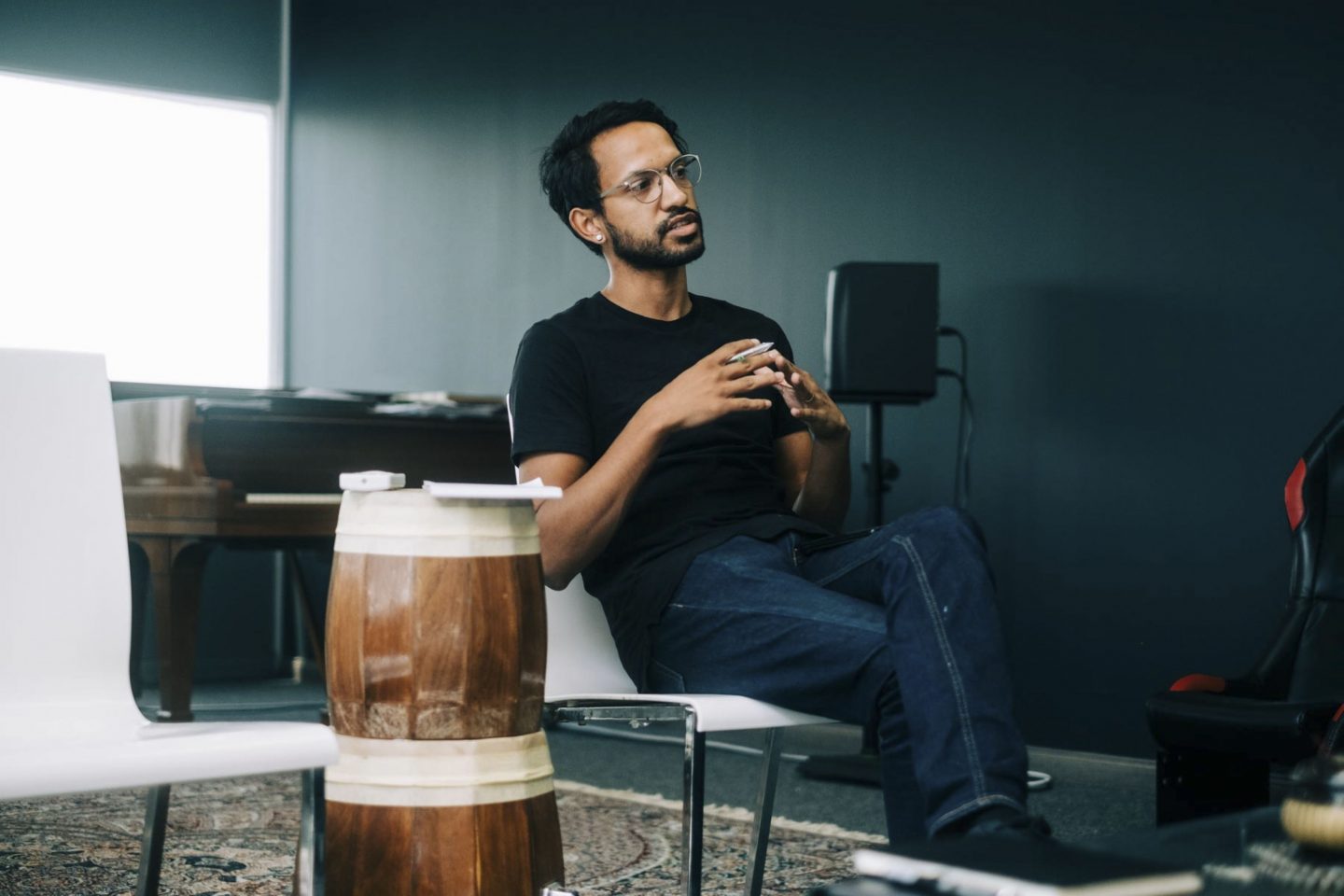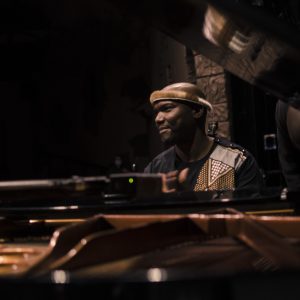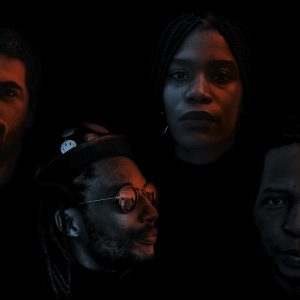SA pianist Kyle Shepherd’s journey into film
Already a successful musician, the multiple award-winning composer learned the art of scoring from scratch. He reflects on the dedication it took to shift his music from the stage to the screen.
Author:
19 January 2021

“I’ve probably written more music than I ever have in the last five years,” says pianist Kyle Shepherd. But many may not know how prolific he’s been. For the past six years, Shepherd has steadily moved into composing for film, which has become an alternate avenue for his creativity. From 2008, he worked tirelessly as a full-time pianist, carving out his place as one of the most accomplished of his generation. It took years of focus, passion and dedication. And it is precisely these attributes that nurture his talent for scoring.
Shepherd’s foray into film and television scoring was reluctant at first. In late 2015, he was approached by filmmaker Aryan Kaganof, the original director for feature film Noem My Skollie, to create its soundtrack. Shepherd admits that at the time he did not even own a computer. He did not need to because the piano served all his creative needs.
Shepherd describes the process of entering this world as a baptism by fire. “It’s not everyone that gets that start in the industry. When Aryan asked me, I literally said no because I had no idea how to do it. To put it into context, I was heavily into being a performing pianist at that time, so it wasn’t even an interest of mine at all,” he says.
Related article:
Shepherd approached the task through rigorous study of all the technical skills required for this work. “I started researching and studying the set-ups of composers like Hans Zimmer and Danny Elfman and realised, ‘Oh my God, you literally need a room full of computers and speakers.’ To really work proficiently, you need the equipment.” From composing to sound editing, scoring is done on a computer, and he had to adapt quickly.
Noem My Skollie became a commercial success. It was the South African entry for Best Foreign Language Film in the 2017 Academy Awards. For his work on the score, Shepherd was nominated for a South African Film and Television Award and also won Best Musical Composition at the 2018 Humanities and Social Sciences Awards.
Home, in a studio
After accumulating equipment over time and to be more connected to the film community, Shepherd relocated his home studio to Atlantic Studios in Montague Gardens, Cape Town, in 2018. This is where we meet for the interview.
The dark room is filled with keyboards, computers and speakers that emit crisp, loud sound. A huge screen sits across the room – it’s easy to imagine how this space comes alive during production.
Shepherd explains that creating sound for film or TV is a careful balancing act of working on many productions at once. It’s labour intensive, deadline driven and high pressure with a quick turnaround time. He is emphatic about the importance of self study. He has journals filled with notes from YouTube tutorials and credits the internet with helping him learn all the technical aspects of the work. Shepherd now has a growing collection of analogue synthesisers and describes his scoring style as “a combination between synth and orchestra”, with the piano naturally creeping in.

“Going from not even having a computer to everything I have in the studio now in six years has been quite a journey,” he says. “I had fun working on Noem My Skollie. I realised there was a great opportunity in this industry, and it was fun enough to keep me interested. That’s very important.”
Shepherd often composes music early in the filming process. “I try to learn the heart of the story. Sometimes, I don’t need the full details. I don’t always read the script. And then I just write music without any information. I write in open form. Usually, I come up with five or 10 pieces. And somewhere in between that, we find the main theme. Once you have your theme, you can really blast out from there. It’s also nice to write music that’s not restricted by the scene or edit.”
After the success of Noem My Skollie, the feature film Fiela Se Kind followed in 2019, for which he was awarded Best Original Score at the Silwerskerm Film Festival. Shepherd has scored various works, including the film Barakat (2020) by Amy Jephta and a popular series for kykNET called Koortjies met Jonathan Rubain. He is currently working on an action-thriller, Indemnity, which is due for release this year.
Related article:
He dismisses notions that scoring for film or television is easier than composing for an album. “You have to write music that’s simpler and more accessible to people because you are serving the film. It’s easier for me to write very challenging jazz music. But now I must write music that’s got to land emotionally according to what’s intended, and that’s very hard. I spend a lot of time on this.” The hard work is not without its rewards. Productions commissioned by streaming service Netflix now have him on board to work on soundtracks. These include the second season of the South African hit series Blood & Water and an upcoming United Kingdom-based feature film.
This journey has also been important in other ways.
“I think a film composer’s first hurdle is to get over yourself, because it’s not about you,” he says. “You’re not writing an album of music for yourself that you’re going to print LPs with. I had to learn that quickly.”
Shepherd believes a signature sound is still possible without being self-indulgent and by letting the film shine, so dialogue, storyline and performances are respected.
The hybrid-artist’s life
Before doing scoring work, Shepherd released seven acclaimed albums. He performed extensively, both locally and internationally, which gained him a significant following.
“I like the hybrid-artist life. I perform more seldomly now. I started enjoying that side of my life more because I wasn’t doing it so often. And in a way, my life as a whole doesn’t depend on playing 50 gigs a month, which is impossible. It helps you enjoy it again.
“There were moments of falling out of love with it, of feeling very discouraged about the fact that there’s no conducive venues to play. But then I could free myself from it. And I found a way to be creative, which is this. Personally, [it] has been really uplifting. So, when I do want to play, or a good offer comes my way, it just feels better.”
Shepherd is biding his time but would still “love to be performing”. “I knew that this time would come when the attendance at the jazz club would continue to dwindle. Pandemic or not. What jazz club could stay open for longer than a few years? It was a wake-up call for me personally. I quickly managed to see that [exclusively playing music in jazz clubs] was something that was not going to be sustainable versus working in film or TV, which I think in South Africa is more on the upward trajectory now.”
The pandemic and the process
The outbreak of Covid-19 has deeply affected how artists perform – and the process of releasing albums and performing go hand in hand for him.
“Albums and performances are very closely linked for me, so having [an album] but also strengthening that release with performing and touring, if you’re lucky. I don’t see how one can exist without the other.”
Since the beginning of the pandemic, Shepherd has done only two live-stream performances – and was “never that convinced by live streaming”. “I knew it wasn’t going to sustain itself,” he says, “because it’s not the way performances are supposed to be. I think people being together in a space, that’s how music is transmitted to people in the right way.”
Reflecting on the many skills artists need to survive today, he says, “It takes a lifetime to reach a level of mastery with just one thing. But now everyone has to kind of be a jack-of-all-trades … It’s kind of sad. If you think of the piano as an instrument, the construction and the make-up of it was mastered hundreds of years ago, and it has not changed. It’s such a specialised thing. Or a glassmaker in Italy – a family who’s been doing it for generations and hundreds of years. The method hasn’t changed. They’ve mastered it. And now we’ve got to do so many different things at once. I just wonder what’s the cost of it to true mastery or artistry. Just to be a virtuosic pianist, there’s not enough time in the day to do anything else.”

Another exciting project Shepherd has worked on over the past two years is a collaboration with artist William Kentridge on the opera Waiting for the Sibyl, commissioned by Teatro dell’Opera in Rome, where it premiered in 2019. The pair met while Shepherd was in residency at the Centre for the Less Good Idea. The massive production involves projections by Kentridge and a cast of singers and dancers led by artist Nhlanhla Mahlangu. “It’s an amazing world that William creates. It’s something I’ve never experienced before,” Shepherd says. Now, a worldwide touring schedule continues to be postponed because of the pandemic.
He also wrote the score for the theatrical production of JM Coetzee’s Life and Times of Michael K, directed by Lara Foot and created by the Handspring Puppet Company, set to open later this year.
“Finding something you enjoy, that creatively stimulates you – it’s a blessing. I’ll take it!” he says. Though Shepherd is a freelancer, working on a project-to-project basis, he feels his dedication has paid off. “I’m glad I’ve invested in all of this over the last six years. Because that’s what it’s been. It’s been a journey to get to the point where productions commissioned by Netflix are calling and constantly sitting down with people operating on that level. It’s been quite a journey. Super-hard work. And very challenging.”


